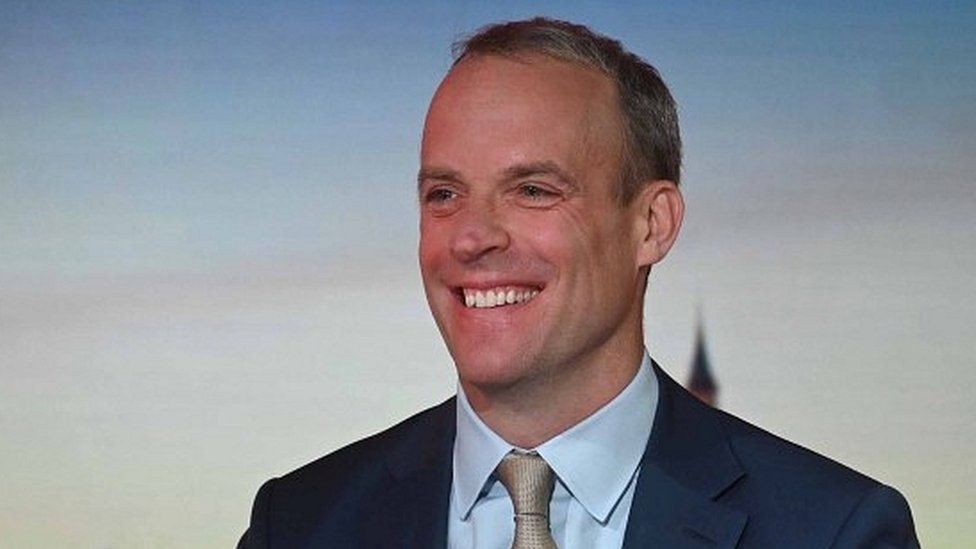ARTICLE AD BOX
By Chris Mason
Political editor, BBC News

Thirteen years ago, a book was published called The Assault on Liberty: What Went Wrong with Rights?
It was seen as a polemic, about the need for a new British Bill of Rights.
A lawyer called Dominic Raab, who was also chief-of staff to the then shadow home secretary, David Davis.
Mr Raab would become a Conservative MP a year later and is now deputy prime minister and justice secretary - and he's introducing a Bill of Rights.
He's not the only politician who has been keen on this for some time.
This has long been a Conservative aspiration: the party's general election manifestos in 2010 and 2015 promised it.
But, until now at least, it hasn't had the bandwidth or numbers in Parliament to do it.
Image source, Council of Europe
Image caption,European Court of Human Rights has nothing to do with the EU
At the root of plenty of Conservative gripes about all this is the Human Rights Act, introduced by Labour in 1998.
It introduced the European Convention on Human Rights into UK law.
An organisation called the Council of Europe is behind the convention. It, confusingly, has nothing to do with the European Union.
Labour's rationale at the time was that being subject to the convention without a domestic Human Rights Act meant the judgements of the European Court of Human Rights, in Strasbourg, France, couldn't be moderated by the UK courts.
But the government's rationale now is that the effect of the Human Rights Act has been to gold-plate the decisions of the court.
'Elastic approach'
When I sat down for an interview with the deputy prime minister in his Commons office, he claimed the consequence of this had been what he called a "human rights inflation" - an "expansive, elastic approach to human rights" - which had not been "subject to proper democratic oversight" and had "undermined the credibility of human rights".
So why not pull out of the convention entirely?
"Well," Mr Raab said, "I don't think pulling out of the European Convention would solve all the problems that some people suggest, because we signed up to a whole range of other conventions, for example, that prevent torture - it's also part of the Good Friday Agreement."
And to test his argument from his opponents' point of view - that he is contemplating chewing up, if not scrapping, a longstanding international commitment the UK has given - he told me: "No. We're staying within the convention.
"We're availing ourselves of the leeway that the Strasbourg court itself says that state parties have. And, do you know what, the worst thing for human rights is for it to become discredited.
"Either because we see challenges which stop us dealing with the appalling flow in human misery across the Channel, or because we've got spurious elastic interpretations of human rights that allow foreign national offenders, these dangerous people, to trump the overwhelming public interest in removing them from this country.
"That's the real threat to human rights."
Mr Raab argued that the Human Rights Act made it harder to keep the most dangerous criminals isolated from other prisoners and placed a "regulatory burden" on police forces to inform gang leaders that there may be a threat to their life.
You might think that would be the job of a police force, and Mr Raab acknowledged that, but he argued that that ought to be an operational decision officers take in each individual case, rather than a "universal, judicially enforceable human right" costing some forces "thousands and thousands of pounds".
Ministerial control?
The Bill of Rights will also, I'm told, protect the "ministerial veto" over the release of the most dangerous criminals.
The aim is that some murderers, rapists, child abusers and terrorists won't be able to walk out of prison without democratic accountability.
The bill will oblige courts to "have regard to" the importance of reducing risk to the public from convicted criminals.
This is the essence of what the government is proposing, and the debate now begins in earnest, having bubbled away for some time already.
Four parliamentary committees have already demanded the plans be "subject to the fullest amount of public and parliamentary scrutiny to ensure their appropriateness, practicality, and longevity".
They wanted this to happen as soon as possible, in what is called pre-legislative scrutiny.
Opposition
Before we even see the bill itself, we can see critics lining up, likely to be noisy and angry.
The Law Society of England and Wales says it represents a "collision course with the rule of law".
Labour describes the Bill of Rights as a "con" and "fraudulent", and fears it will stop victims of terrorist attacks and disasters like Hillsborough from seeking justice.
This argument will continue for months.

 2 years ago
17
2 years ago
17








 English (US)
English (US)